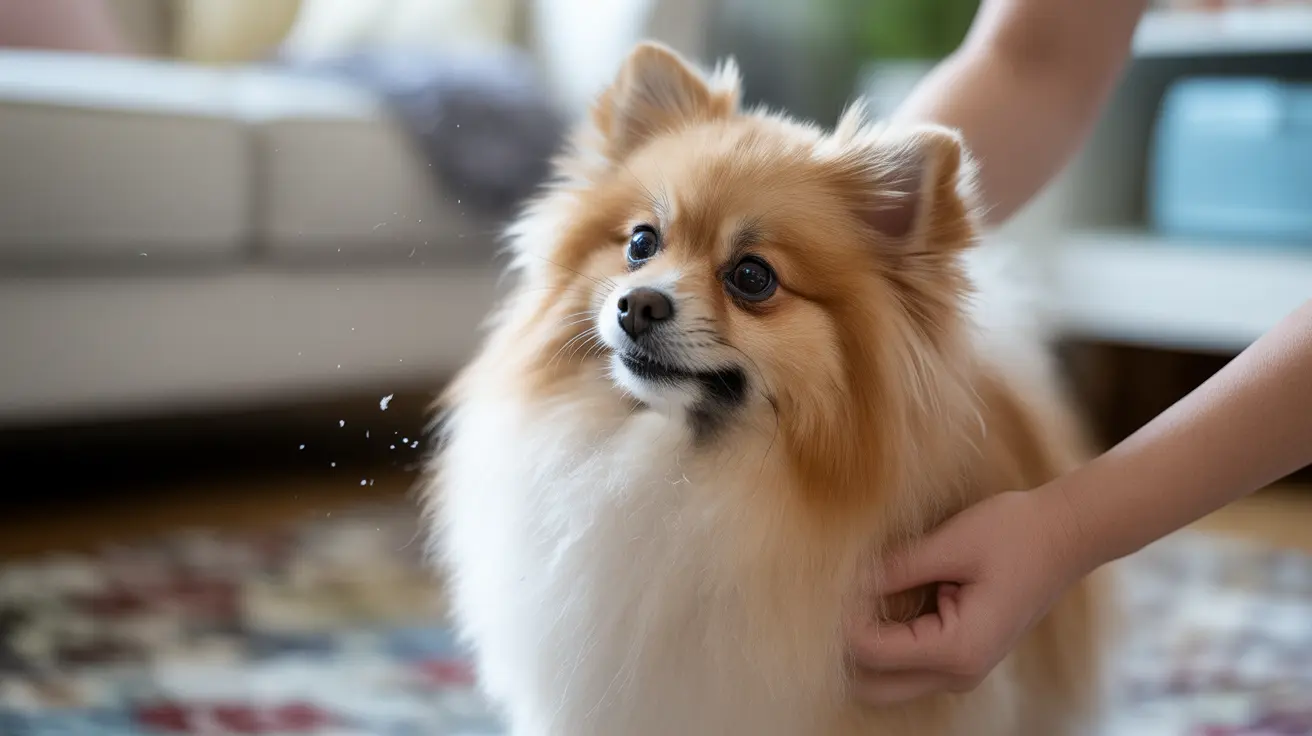愛犬の被毛や寝具に白いフケが目立つようになった場合、それは「犬 フケ」のサインかもしれません。犬のフケは多くの犬でみられる一般的な皮膚トラブルで、かゆみや皮膚の乾燥を伴うため、犬にとっても飼い主にとっても気になる症状です。
犬のフケとは?原因と発生メカニズム
犬にフケが出る理由は、皮膚の角質細胞が異常もしくは過剰に剥がれ落ちることで、被毛に白いフレーク状の粒が見える現象です。犬 フケ 原因には、乾燥した空気、バランスの悪い食事、アレルギー、または犬 フケ 病気といった様々な因子が関係します。通常であればある程度の皮膚の新陳代謝は問題ありませんが、フケが多量に出る場合は、何らかのトラブルが隠れている可能性があります。
犬のフケが起こる主な要因
環境要因
特に冬場になると、室内の空気が乾燥しやすくなり、犬 フケ 冬 乾燥が目立つ傾向にあります。加湿器を使用するなどして部屋の湿度を30~50%に保つことが、犬 皮膚 乾燥 対策やフケ予防につながります。
食事に関する問題
犬 フケ 食事 関連も非常に重要です。不適切な食事や必須脂肪酸(オメガ3・オメガ6)の不足は、皮膚の健康維持方法に悪影響を及ぼします。犬 皮膚 サプリメントや栄養バランスの良い食事で、被毛と皮膚を内側からサポートしましょう。
基礎疾患
犬 フケ 病気やさまざまな皮膚トラブルがフケを悪化させることがあります。主な原因としては以下のようなものが挙げられます:
- 脂漏症(オイリータイプと乾燥タイプ)
- 犬 アレルギー フケ(環境や食物が原因の場合あり)
- 犬 フケ 寄生虫 関連(ダニやノミなどの寄生虫感染)
- ホルモンバランス異常
- 犬 フケ 真菌 感染や細菌感染
効果的な犬のフケ治し方・ケア方法
適切なグルーミング
犬 フケ グルーミングを定期的に行うことで、皮膚の自然な油分を被毛全体に行き渡らせ、死んだ角質やフケを除去できます。犬の被毛タイプに適したブラシを使い、習慣的にケアしましょう。これは、犬 フケ 飼い主ができるケアの第一歩です。
薬用ケア・治療
症状が続く場合や重症化した時は、動物病院で下記のような対策を提案されることがあります:
- 犬 フケ シャンプー 頻度に配慮した、医薬品配合の専用シャンプー
- 犬 フケ 保湿 方法に特化した保湿トリートメント
- 薬用スプレーや軟膏
- 基礎疾患に対する経口薬
食事改善・栄養サポート
食事を見直すことで、犬 皮膚の健康 維持 方法の基盤をつくります。ポイントは以下の通りです:
- 高品質な動物性たんぱく源
- 必須脂肪酸を含むサプリメント
- ビタミンE豊富な食材
- 十分な水分補給
フケの予防法と日常ケア
フケを繰り返さないための犬皮膚病予防法や日常で気を付けるべき点は次の通りです:
- 定期的なグルーミング習慣
- 犬専用のシャンプーや保湿剤の使用
- 室内湿度のコントロール
- バランス良い食事と水分補給
- 定期的な健康診断
いつ動物病院へ相談すべき?
下記のような犬 フケ 悪化 受診目安がみられる場合は、早めに動物病院を受診してください:
- 長期間続く、または重度の犬 フケ
- 犬 フケ かゆみが強く、しきりに掻いてしまう場合
- 犬 皮膚 赤み フケや炎症・腫れ
- 犬 抜け毛 フケ 同時に大量に発生
- 皮膚から強いにおいがする
- 食欲や行動に明らかな変化がある
よくある質問
犬にフケが出る主な原因は何ですか?
犬にフケが出る主な原因は、乾燥した空気やアレルギー、栄養バランスの乱れ、基礎疾患(脂漏症・寄生虫感染・真菌や細菌感染など)です。多くの場合は適切な食事やグルーミング、原因となる疾患への対処で改善が期待できます。
犬のフケと皮膚病はどのように見分けますか?
一般的な犬のフケは、白いフレークが見られるものですが、赤みや炎症、強いかゆみ、におい、行動変化など他の症状が伴う場合は、皮膚病や深刻なトラブルの可能性を考えましょう。
愛犬にフケが増えた場合、まず何をすればよいですか?
まずはブラッシングなどグルーミングを整え、乾燥への対策や食事内容の見直しを行いましょう。症状が改善しない場合は動物病院に相談してください。
どのような症状があれば動物病院を受診すべきですか?
フケが長期間改善しない、犬のかゆみが強い、皮膚赤みや抜け毛、嫌な臭い、食欲や行動の変化がみられる場合は早めの受診が目安です。
犬のフケは季節によって増減しますか?
冬場や乾燥した時期は、特にフケが出やすくなります。湿度管理と保湿対策が重要です。
家庭でできる犬のフケ対策には何がありますか?
定期的なブラッシング、オートミールバス、ココナッツオイルマッサージなどが有効です。ただし症状が続いたり悪化した場合は獣医師に相談しましょう。
犬の食事内容はフケに影響しますか?おすすめの栄養素は?
食事の質はフケと密接に関係があります。オメガ3脂肪酸(魚など)、高品質なたんぱく質、ビタミンA・Eが皮膚の健康維持に役立ちます。場合によってはサプリメントの追加も有効です。
犬用シャンプーや保湿剤はどのように選べばよいですか?
犬専用で保湿成分を含む低刺激タイプや、フケ対策用の薬用シャンプーを選ぶのがポイントです。シャンプーの頻度も多すぎないよう注意しましょう。
フケが多い犬種や年齢層はありますか?
本文では特定の犬種や年齢層についての記載はありませんが、被毛や皮膚質、体質によって個体差があります。
犬のフケが赤みやかゆみを伴う場合の対処法は?
皮膚の赤みやかゆみが伴う場合は、炎症や皮膚病の初期症状の可能性がありますので、早めに動物病院で診断を受けてください。
犬のフケを予防するために日常で気を付けるべきことは?
定期的なグルーミング、室内の湿度管理、適切な食事、水分補給、犬専用ケア用品の使用、そして定期的な健康診断を心がけましょう。






